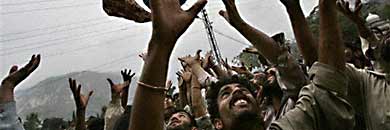Storms hamper quake relief

Trucks of aid arrived in the ruined capital of Pakistan-ruled Kashmir today. Victims scuffled for badly needed food and blankets three days after a devastating earthquake flattened whole communities, killing tens of thousands and leaving millions homeless.
Heavy rain compounded the misery of the survivors, and forced some helicopters loaded with food and medicine to cancel their flights to stricken areas.
The government's official death toll remained at slightly over 20,000 people, but a senior army official who is close to the rescue operations, said that "according to our assessment, the death toll is between 35,000 to 40,000 people."
Most of the dead were in the Himalayan region of Kashmir, said the official, who requested anonymity as he wasn't authorised to comment to journalists about it.
The estimate tallied with those of local officials.
With winter approaching, the United Nations said 2.5 million people in the worst-hit areas near the mountainous Pakistan-India border need shelter.
US military helicopters helped ferry wounded people from the wrecked city of Muzaffarabad, while international rescue teams joined searches during the waning days of hope for finding survivors. A French team reportedly rescued 40 children from a buried school in another northern town late yesterday.
About 10 trucks brought by Pakistani charities and volunteers rumbled into Muzaffarabad, where efforts by relief workers to distribute aid turned chaotic as residents scuffled for the handouts of cooking oil, sugar, rice, blankets and tents.
It was the first major influx of aid since the monster 7.6-magnitude quake struck on Saturday morning, destroying most homes and all government buildings in this city, and leaving its 600,000 people without power or water. Most have spent three cold nights without shelter.
Two or three police looked on helplessly as more than 200 people raided a stock of food arranged by relief workers at a soccer field near Muzaffarabad's centre - one of six designated aid distribution points. One man made off with a big sack of sugar, another left on a motorised rickshaw with a big crate of drinking water.
"Relief activity has started on a massive level," said deputy city commissioner Masood-ur Rehman. He said two army brigades would start clearing roads and debris in the city today.
The UN World Food Program began a major airlift of emergency supplies. Japan pledged US$20 million (euro16.5 million) in aid, Canada US$17 million (euro14 million), after some criticism at home that its initial pledge was too small. The United States on Monday offered up to US$50 million (euro41 million).
Pakistan army spokesman General Shaukat Sultan said a total of 30 helicopters, including eight US military choppers diverted from the war in neighbouring Afghanistan, would be supplying food, water, medicine and other items to quake victims. Two more German and four Afghan helicopters would arrive later today, he said.
Even long-time rival India planned to send a planeload of food, tents and medicine after Pakistan set aside its often-bitter rivalry with its nuclear neighbor and said that it would accept New Delhi's aid.
Rescue teams, including Britons, Germans and Turks, used high-tech cameras and lifting gear to search for survivors under piles of concrete, steel and wood.
US military helicopters helped ferry wounded people from the wrecked city of Muzaffarabad, while international rescue teams joined searches during the waning days of hope for finding survivors.
At least half a dozen children were rescued yesterday from a damaged school in the northern town of Balakot, and rescuers pulled a teen-age boy from rubble on Tuesday, 78 hours after the quake.
"He's alive," rescuers shouted with joy. People gave the food and water to the boy and kissed him on the head. The area where he was rescued smelled heavily of decomposing corpses.
Thousands of civilian volunteers, some carrying picks and shovels on the shoulders, walked north toward quake-hit towns.
In North West Frontier Province, at least 3,500 people have died and more than 8,500 are injured, and many areas have yet to be reached by rescue teams, an official of the crisis management office said. But he said that about 10,000-12,000 people may have died according to unconfirmed reports.
"We know that several villages in Mansehra district were completely wiped out, and many among the dead were schoolchildren," said the official, who didn't want to be named because he is not authorised to speak to the media.
On the Indian side of the militarised border in divided Kashmir, the toll rose today to 1,005.
President General Pervez Musharraf said his government was doing its best to respond to the crisis.
"We are doing whatever is humanly possible," Musharraf said. "There should not be any blame game. We are trying to reach all those areas where people need our help."
Join our commenting forum
Join thought-provoking conversations, follow other Independent readers and see their replies
Comments